人教PEP版六年级上册语法讲解与强化训练 Unit 3 My weekend plan(含答案)
文档属性
| 名称 | 人教PEP版六年级上册语法讲解与强化训练 Unit 3 My weekend plan(含答案) | 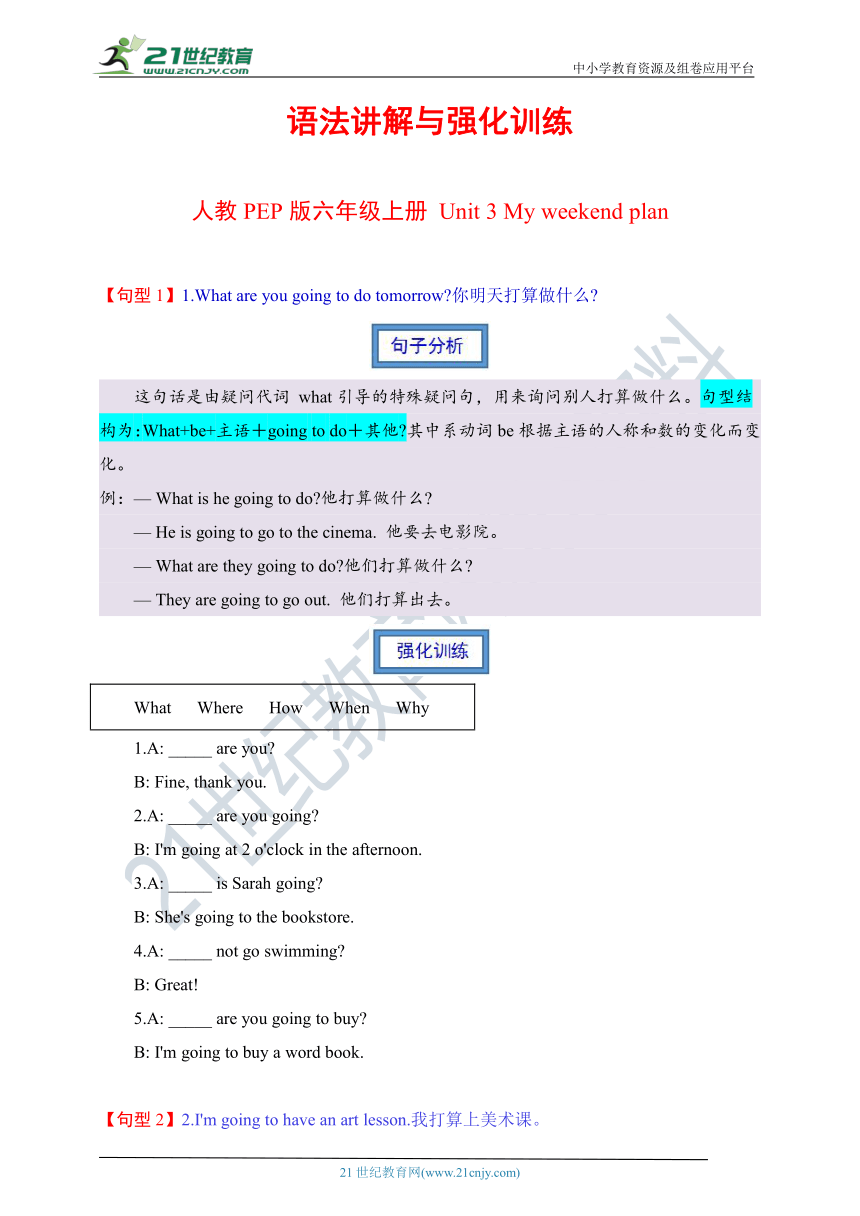 | |
| 格式 | doc | ||
| 文件大小 | 1.2MB | ||
| 资源类型 | 试卷 | ||
| 版本资源 | 人教版(PEP) | ||
| 科目 | 英语 | ||
| 更新时间 | 2022-09-20 17:01:11 | ||
图片预览

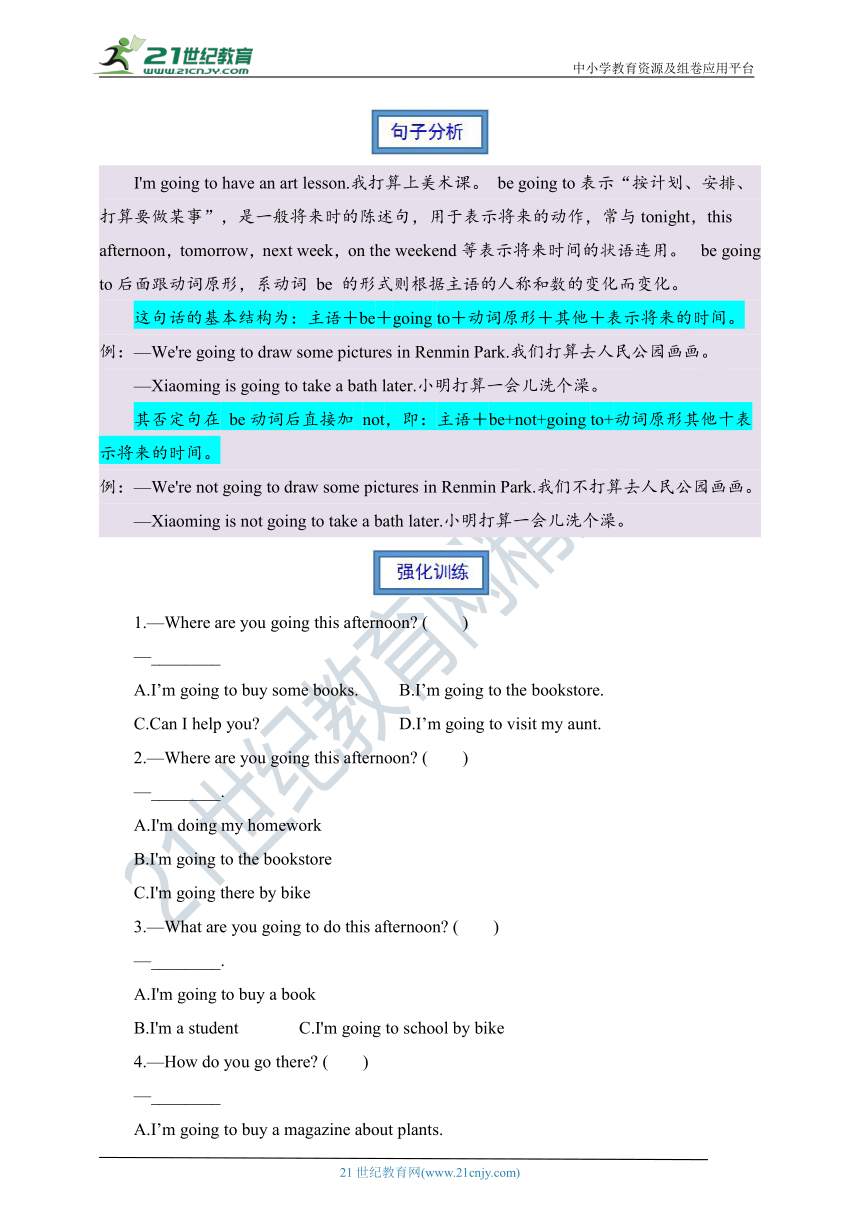
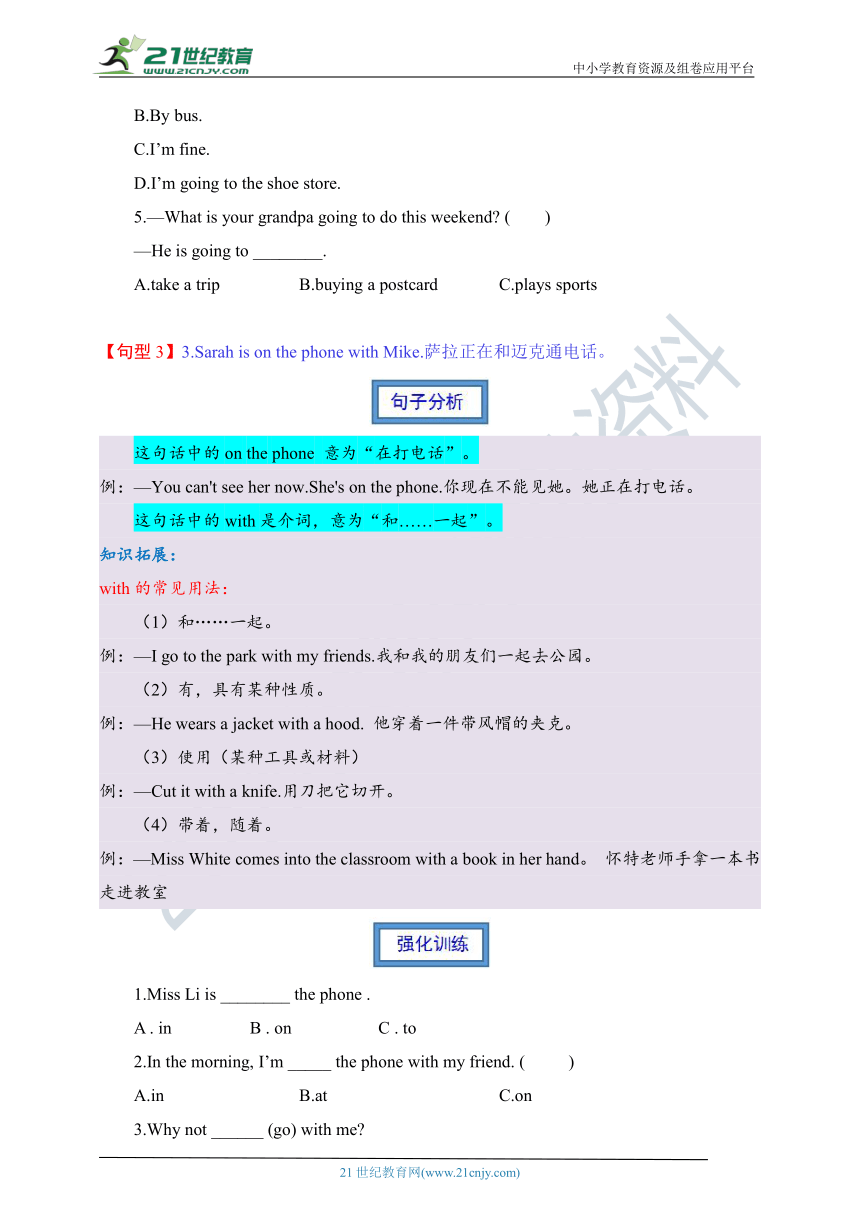
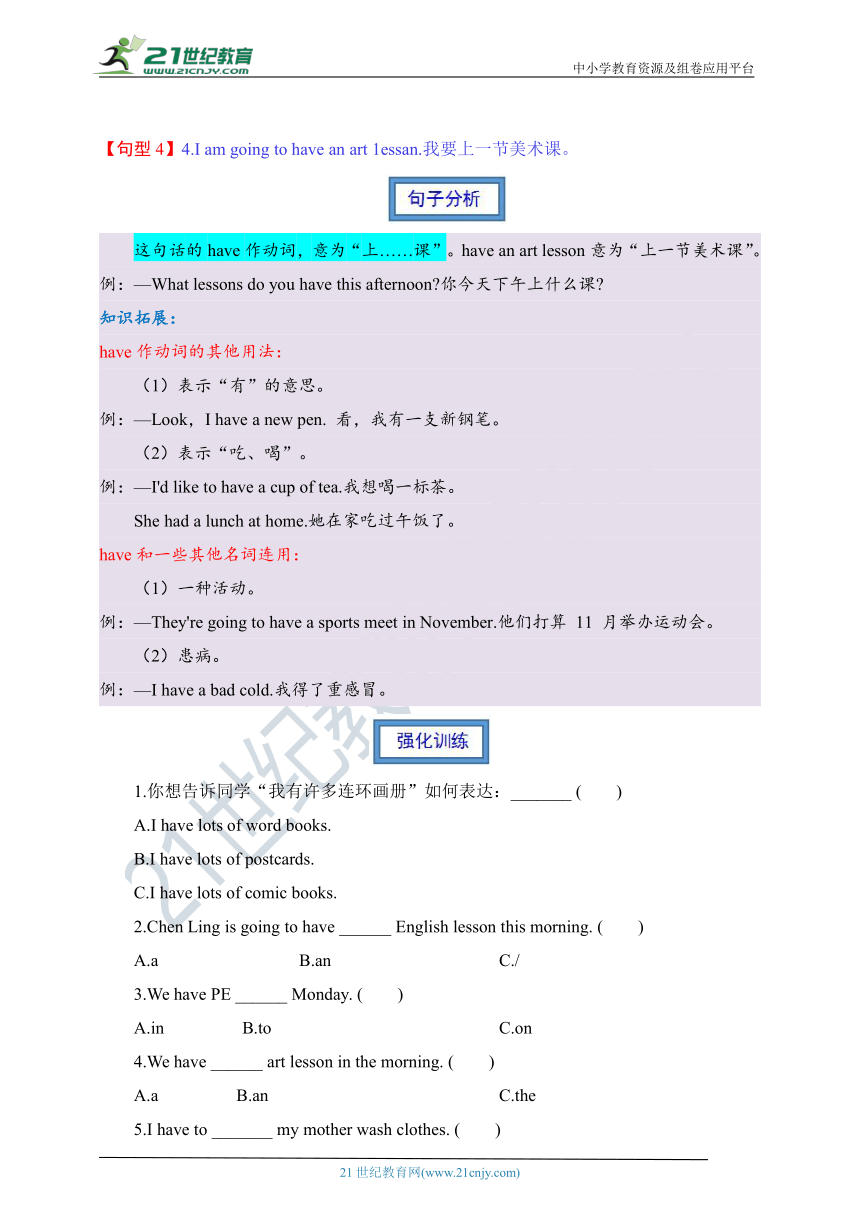
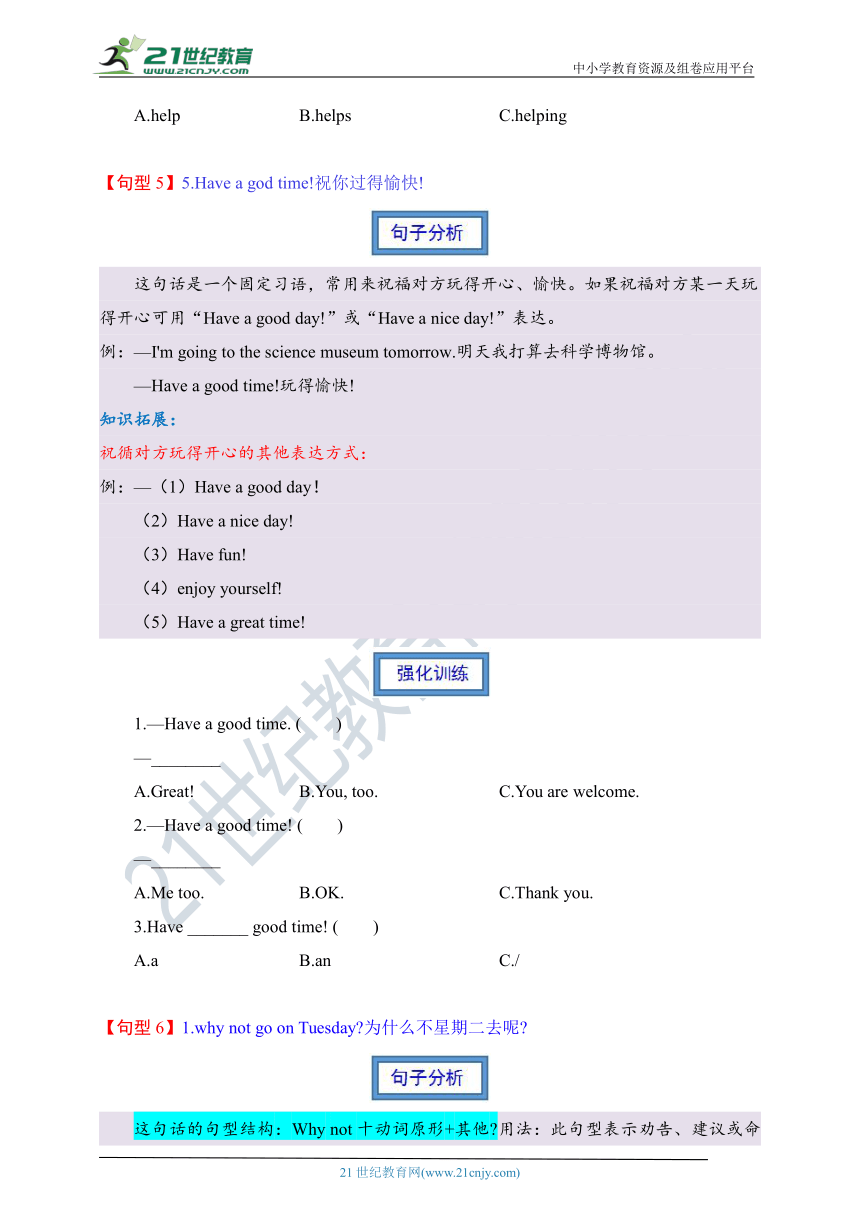
文档简介
中小学教育资源及组卷应用平台
语法讲解与强化训练
人教PEP版六年级上册 Unit 3 My weekend plan
【句型1】1.What are you going to do tomorrow 你明天打算做什么
这句话是由疑问代词 what引导的特殊疑问句,用来询问别人打算做什么。句型结构为:What+be+主语+going to do+其他 其中系动词be根据主语的人称和数的变化而变化。
例:— What is he going to do 他打算做什么
— He is going to go to the cinema. 他要去电影院。
— What are they going to do 他们打算做什么
— They are going to go out. 他们打算出去。
What Where How When Why
1.A: _____ are you
B: Fine, thank you.
2.A: _____ are you going
B: I'm going at 2 o'clock in the afternoon.
3.A: _____ is Sarah going
B: She's going to the bookstore.
4.A: _____ not go swimming
B: Great!
5.A: _____ are you going to buy
B: I'm going to buy a word book.
【句型2】2.I'm going to have an art lesson.我打算上美术课。
I'm going to have an art lesson.我打算上美术课。 be going to表示“按计划、安排、打算要做某事”,是一般将来时的陈述句,用于表示将来的动作,常与tonight,this afternoon,tomorrow,next week,on the weekend等表示将来时间的状语连用。 be going to后面跟动词原形,系动词 be 的形式则根据主语的人称和数的变化而变化。
这句话的基本结构为:主语+be+going to+动词原形+其他+表示将来的时间。
例:—We're going to draw some pictures in Renmin Park.我们打算去人民公园画画。
—Xiaoming is going to take a bath later.小明打算一会儿洗个澡。
其否定句在 be动词后直接加 not,即:主语+be+not+going to+动词原形其他十表示将来的时间。
例:—We're not going to draw some pictures in Renmin Park.我们不打算去人民公园画画。
—Xiaoming is not going to take a bath later.小明打算一会儿洗个澡。
1.—Where are you going this afternoon ( )
—________
A.I’m going to buy some books. B.I’m going to the bookstore.
C.Can I help you D.I’m going to visit my aunt.
2.—Where are you going this afternoon ( )
—________.
A.I'm doing my homework
B.I'm going to the bookstore
C.I'm going there by bike
3.—What are you going to do this afternoon ( )
—________.
A.I'm going to buy a book
B.I'm a student C.I'm going to school by bike
4.—How do you go there ( )
—________
A.I’m going to buy a magazine about plants.
B.By bus.
C.I’m fine.
D.I’m going to the shoe store.
5.—What is your grandpa going to do this weekend ( )
—He is going to ________.
A.take a trip B.buying a postcard C.plays sports
【句型3】3.Sarah is on the phone with Mike.萨拉正在和迈克通电话。
这句话中的on the phone 意为“在打电话”。
例:—You can't see her now.She's on the phone.你现在不能见她。她正在打电话。
这句话中的with是介词,意为“和……一起”。
知识拓展:
with的常见用法:
(1)和……一起。
例:—I go to the park with my friends.我和我的朋友们一起去公园。
(2)有,具有某种性质。
例:—He wears a jacket with a hood. 他穿着一件带风帽的夹克。
(3)使用(某种工具或材料)
例:—Cut it with a knife.用刀把它切开。
(4)带着,随着。
例:—Miss White comes into the classroom with a book in her hand。 怀特老师手拿一本书走进教室
1.Miss Li is ________ the phone .
A . in B . on C . to
2.In the morning, I’m _____ the phone with my friend. ( )
A.in B.at C.on
3.Why not ______ (go) with me
【句型4】4.I am going to have an art 1essan.我要上一节美术课。
这句话的have作动词,意为“上……课”。have an art lesson意为“上一节美术课”。
例:—What lessons do you have this afternoon 你今天下午上什么课
知识拓展:
have作动词的其他用法:
(1)表示“有”的意思。
例:—Look,I have a new pen. 看,我有一支新钢笔。
(2)表示“吃、喝”。
例:—I'd like to have a cup of tea.我想喝一标茶。
She had a lunch at home.她在家吃过午饭了。
have和一些其他名词连用:
(1)一种活动。
例:—They're going to have a sports meet in November.他们打算 11 月举办运动会。
(2)患病。
例:—I have a bad cold.我得了重感冒。
1.你想告诉同学“我有许多连环画册”如何表达:_______ ( )
A.I have lots of word books.
B.I have lots of postcards.
C.I have lots of comic books.
2.Chen Ling is going to have ______ English lesson this morning. ( )
A.a B.an C./
3.We have PE ______ Monday. ( )
A.in B.to C.on
4.We have ______ art lesson in the morning. ( )
A.a B.an C.the
5.I have to _______ my mother wash clothes. ( )
A.help B.helps C.helping
【句型5】5.Have a god time!祝你过得愉快!
这句话是一个固定习语,常用来祝福对方玩得开心、愉快。如果祝福对方某一天玩得开心可用“Have a good day!”或“Have a nice day!”表达。
例:—I'm going to the science museum tomorrow.明天我打算去科学博物馆。
—Have a good time!玩得愉快!
知识拓展:
祝循对方玩得开心的其他表达方式:
例:—(1)Have a good day!
(2)Have a nice day!
(3)Have fun!
(4)enjoy yourself!
(5)Have a great time!
1.—Have a good time. ( )
—________
A.Great! B.You, too. C.You are welcome.
2.—Have a good time! ( )
—________
A.Me too. B.OK. C.Thank you.
3.Have _______ good time! ( )
A.a B.an C./
【句型6】1.why not go on Tuesday 为什么不星期二去呢
这句话的句型结构:Why not十动词原形+其他 用法:此句型表示劝告、建议或命令,意为“为什么不……呢 ”
例:—Why not go swimming 为什么不去游泳呢?
—Why not go there at once 为什么不马上去那儿呢
用单词的正确形式填空。
1.Why not ________ (go) on Sunday
2.Why not ________ (go) on Tuesday ________ (it) ________ (be) half price then!
3.Why ________ ( not/not to)go on Monday
4.Why not _________ an English dictionary ( )
A.to buy B.buying C.buy
5.---Why not________ some books ( )
--- Good idea.
A.read B.reads C.reading
6.Why not________ on Tuesday ( )
A.to go B.going C.go
【句型7】7.When are you going 你们什么时候去
这句话是由 when引导的特殊疑问句,用来用来询问对方打算何时傲某事。
例:—When are you going to the library 你打算什么时候去图书馆
—At 2:00 this afternoon.今天下午2点。
—When are you going to visit your teacher 你打算什么时候去拜访你的老师
—Tomorrow.明天(去)。
判断正误,错误的填写F,正确的填T。
A: What are you going to do this afternoon
B: I’m going to visit my teacher.
A: How are you going to get there
B: I’m going to get there by subway.
A: Where does he live
B: His home is next to the post office. I can turn left at the traffic lights in front of the subway station, then go straight. His home is on the right.
A: I’m going to the post office this afternoon. Let’s go together after lunch.
B: OK!
1.B is going to visit his teacher.( )
2.B is going by bus.( )
3.A is going to the bookstore.( )
4.B’s teacher’s home is next to the post office.( )
5.A and B are going to go together after lunch.( )
参考答案
强化训练1
1.How【解析】句意:—你______吗?—很好,谢谢你。根据答语,可知问句问的是你好吗?How怎样?疑问副词,符合题意,故答案为How。
2.When【解析】句意:—你要______去?—我要下午两点去。根据答语中的时间,可知问句问的是你要什么时候去,When什么时候,疑问副词,符合题意,故答案为When。
3.Where【解析】句意:—萨拉要去______?—她要去书店。根据答语中的地点,可知问句问的萨拉要去哪里?Where哪里,疑问副词,符合题意,故答案为Where。
4.Why【解析】句意:—______不去游泳呢?—太好了!根据答语,可知问句问的为什么不去游泳呢? Why为什么,疑问副词,符合题意,故答案为Why。
5.What【解析】句意:—你打算买______?—我打算买一本单词书。根据答语,可知问句问的你打算买什么?What什么,疑问代词,符合题意,故答案为What。
强化训练2
1.B【解析】句意:—今天下午你要去哪里?—_____A我要去买一些书。B我要去书店。C我能帮你吗?D我要去拜访我的姑姑。根据问句可知答语是要去的地方,结合选项,故选B。
2.B【解析】句意:—今天下午你要去哪里?—_____。A我正在做作业。B我要去书店。C我骑自行车去那里。问句是一般将来时态,故选B。
3.A【解析】问句句意:今天下午你打算做什么?A我打算买本书。B我是学生。C我打算乘自行车去上学。根据问句可知A选项符合,故选A。
4.B【解析】句意:—你怎么去那里?—____A我打算买一本关于植物的杂志。B乘公共汽车去。C我很好。D我要去鞋店。根据句意应回答交通工具,结合选项,故选B。
5.A【解析】句意:—你爷爷这个周末要做什么?—他要____。take a trip去旅行,动词原形:buying a postcard买一张明信片,现在分词或动名词:plays sports做运动,动词第三人称单数:由句中的 this weekend,可知问句为一般将来时,答句也为一般将来时,is going to后面接动词原形,故选A。
强化训练3
1.B【解析】句意:李小姐在打电话。打电话是固定短语“on the phone”,因此用介词on。
2.C【解析】句意:在上午,我和我的朋友在通电话。on the phone通电话,固定搭配,故选C。
3.go【解析】句意:为什么不和我一起去呢?为什不……Why not do,故答案为go。
强化训练4
1.C【解析】A.I have lots of word books.我有许多词典。B.I have lots of postcards.我有许多明信片。C.I have lots of comic books.我有许多连环画册。根据题干意思,A、B选项不符合,C选项符合。故选C。
2.B【解析】句意:陈玲今天早上要上一节英语课。English是以元音音素开头的单词,前面用不定冠词an,故选B。
3.C【解析】句意:星期一我们有体育课。在星期前面用介词on。故选C。
4.B【解析】句意: 我们早上有一节美术课。 the是定冠词,是强调特指:不定冠词a/an,强调数量,本句强调数量,art是以元音音素开头的单数名词,前面用不定冠词an修饰,表示一节。故选B。
5.A【解析】句意:我不得不帮妈妈洗衣服。have to后跟动词原形,故选A。
强化训练5
1.B【解析】Have a good time.用来祝愿他人玩得开心愉快,通常可用“Thanks.”“Thank you.”“You too.”等回答,Great!(好极了!)和You are welcome.(不用谢。)均不符合语境。故选B。
2.C【解析】Have a good time! 用来祝愿他人玩得开心愉快,通常可用“Thanks.”“Thank you.”“You too.”等回答,Me too.和OK.均不符合语境。故选C。
3.A【解析】句意:玩得开心/高兴!have a good time是表示祝愿的固定句型。a/ an都是不定冠词,其中a用于辅音音素开头的单词前,an用于元音音素开头的单词前,而good是辅音音素开头的单词,所以前面用不定冠词a。故选A。
强化训练6
1.go【解析】略。
2.go It is【解析】句意:为什么不周二去?那是打半价。why not后面接动词原形,所以是go,it是主语,所以be动词是is,故答案为go:It:is。
3.not【解析】句意:为什么不礼拜一去呢?“为什么不”用Why not,后面不需要加介词to,故答案为not。
4.C【解析】句意:为什么不买一本英语字典呢?“Why not + 动词原形+其他 ”构成提建议的一种句型,意为“为什么不……呢?”,故选C。
5.A【解析】略。
6.C【解析】略。
强化训练7
1.T【解析】句意:B将要去拜访他的老师。根据B: I’m going to visit my teacher. 可知正确,故答案为T。
2.F【解析】句意:B要乘公交车去。根据B: I’m going to get there by subway. 可知是乘地铁,不是公交车,故答案为F。
3.F【解析】句意:A将要去书店。根据A: I’m going to the post office this afternoon. 可知是去邮局,不是去书店,故答案为F。
4.T【解析】句意:B老师加在邮局附近。根据His home is next to the post office. 且his home指的是老师家,可知正确,故答案为T。
5.T【解析】句意:A和B将要在午餐后一起去。根据 Let’s go together after lunch. 可知正确,故答案为T。
21世纪教育网 www.21cnjy.com 精品试卷·第 2 页 (共 2 页)
HYPERLINK "http://21世纪教育网(www.21cnjy.com)
" 21世纪教育网(www.21cnjy.com)
语法讲解与强化训练
人教PEP版六年级上册 Unit 3 My weekend plan
【句型1】1.What are you going to do tomorrow 你明天打算做什么
这句话是由疑问代词 what引导的特殊疑问句,用来询问别人打算做什么。句型结构为:What+be+主语+going to do+其他 其中系动词be根据主语的人称和数的变化而变化。
例:— What is he going to do 他打算做什么
— He is going to go to the cinema. 他要去电影院。
— What are they going to do 他们打算做什么
— They are going to go out. 他们打算出去。
What Where How When Why
1.A: _____ are you
B: Fine, thank you.
2.A: _____ are you going
B: I'm going at 2 o'clock in the afternoon.
3.A: _____ is Sarah going
B: She's going to the bookstore.
4.A: _____ not go swimming
B: Great!
5.A: _____ are you going to buy
B: I'm going to buy a word book.
【句型2】2.I'm going to have an art lesson.我打算上美术课。
I'm going to have an art lesson.我打算上美术课。 be going to表示“按计划、安排、打算要做某事”,是一般将来时的陈述句,用于表示将来的动作,常与tonight,this afternoon,tomorrow,next week,on the weekend等表示将来时间的状语连用。 be going to后面跟动词原形,系动词 be 的形式则根据主语的人称和数的变化而变化。
这句话的基本结构为:主语+be+going to+动词原形+其他+表示将来的时间。
例:—We're going to draw some pictures in Renmin Park.我们打算去人民公园画画。
—Xiaoming is going to take a bath later.小明打算一会儿洗个澡。
其否定句在 be动词后直接加 not,即:主语+be+not+going to+动词原形其他十表示将来的时间。
例:—We're not going to draw some pictures in Renmin Park.我们不打算去人民公园画画。
—Xiaoming is not going to take a bath later.小明打算一会儿洗个澡。
1.—Where are you going this afternoon ( )
—________
A.I’m going to buy some books. B.I’m going to the bookstore.
C.Can I help you D.I’m going to visit my aunt.
2.—Where are you going this afternoon ( )
—________.
A.I'm doing my homework
B.I'm going to the bookstore
C.I'm going there by bike
3.—What are you going to do this afternoon ( )
—________.
A.I'm going to buy a book
B.I'm a student C.I'm going to school by bike
4.—How do you go there ( )
—________
A.I’m going to buy a magazine about plants.
B.By bus.
C.I’m fine.
D.I’m going to the shoe store.
5.—What is your grandpa going to do this weekend ( )
—He is going to ________.
A.take a trip B.buying a postcard C.plays sports
【句型3】3.Sarah is on the phone with Mike.萨拉正在和迈克通电话。
这句话中的on the phone 意为“在打电话”。
例:—You can't see her now.She's on the phone.你现在不能见她。她正在打电话。
这句话中的with是介词,意为“和……一起”。
知识拓展:
with的常见用法:
(1)和……一起。
例:—I go to the park with my friends.我和我的朋友们一起去公园。
(2)有,具有某种性质。
例:—He wears a jacket with a hood. 他穿着一件带风帽的夹克。
(3)使用(某种工具或材料)
例:—Cut it with a knife.用刀把它切开。
(4)带着,随着。
例:—Miss White comes into the classroom with a book in her hand。 怀特老师手拿一本书走进教室
1.Miss Li is ________ the phone .
A . in B . on C . to
2.In the morning, I’m _____ the phone with my friend. ( )
A.in B.at C.on
3.Why not ______ (go) with me
【句型4】4.I am going to have an art 1essan.我要上一节美术课。
这句话的have作动词,意为“上……课”。have an art lesson意为“上一节美术课”。
例:—What lessons do you have this afternoon 你今天下午上什么课
知识拓展:
have作动词的其他用法:
(1)表示“有”的意思。
例:—Look,I have a new pen. 看,我有一支新钢笔。
(2)表示“吃、喝”。
例:—I'd like to have a cup of tea.我想喝一标茶。
She had a lunch at home.她在家吃过午饭了。
have和一些其他名词连用:
(1)一种活动。
例:—They're going to have a sports meet in November.他们打算 11 月举办运动会。
(2)患病。
例:—I have a bad cold.我得了重感冒。
1.你想告诉同学“我有许多连环画册”如何表达:_______ ( )
A.I have lots of word books.
B.I have lots of postcards.
C.I have lots of comic books.
2.Chen Ling is going to have ______ English lesson this morning. ( )
A.a B.an C./
3.We have PE ______ Monday. ( )
A.in B.to C.on
4.We have ______ art lesson in the morning. ( )
A.a B.an C.the
5.I have to _______ my mother wash clothes. ( )
A.help B.helps C.helping
【句型5】5.Have a god time!祝你过得愉快!
这句话是一个固定习语,常用来祝福对方玩得开心、愉快。如果祝福对方某一天玩得开心可用“Have a good day!”或“Have a nice day!”表达。
例:—I'm going to the science museum tomorrow.明天我打算去科学博物馆。
—Have a good time!玩得愉快!
知识拓展:
祝循对方玩得开心的其他表达方式:
例:—(1)Have a good day!
(2)Have a nice day!
(3)Have fun!
(4)enjoy yourself!
(5)Have a great time!
1.—Have a good time. ( )
—________
A.Great! B.You, too. C.You are welcome.
2.—Have a good time! ( )
—________
A.Me too. B.OK. C.Thank you.
3.Have _______ good time! ( )
A.a B.an C./
【句型6】1.why not go on Tuesday 为什么不星期二去呢
这句话的句型结构:Why not十动词原形+其他 用法:此句型表示劝告、建议或命令,意为“为什么不……呢 ”
例:—Why not go swimming 为什么不去游泳呢?
—Why not go there at once 为什么不马上去那儿呢
用单词的正确形式填空。
1.Why not ________ (go) on Sunday
2.Why not ________ (go) on Tuesday ________ (it) ________ (be) half price then!
3.Why ________ ( not/not to)go on Monday
4.Why not _________ an English dictionary ( )
A.to buy B.buying C.buy
5.---Why not________ some books ( )
--- Good idea.
A.read B.reads C.reading
6.Why not________ on Tuesday ( )
A.to go B.going C.go
【句型7】7.When are you going 你们什么时候去
这句话是由 when引导的特殊疑问句,用来用来询问对方打算何时傲某事。
例:—When are you going to the library 你打算什么时候去图书馆
—At 2:00 this afternoon.今天下午2点。
—When are you going to visit your teacher 你打算什么时候去拜访你的老师
—Tomorrow.明天(去)。
判断正误,错误的填写F,正确的填T。
A: What are you going to do this afternoon
B: I’m going to visit my teacher.
A: How are you going to get there
B: I’m going to get there by subway.
A: Where does he live
B: His home is next to the post office. I can turn left at the traffic lights in front of the subway station, then go straight. His home is on the right.
A: I’m going to the post office this afternoon. Let’s go together after lunch.
B: OK!
1.B is going to visit his teacher.( )
2.B is going by bus.( )
3.A is going to the bookstore.( )
4.B’s teacher’s home is next to the post office.( )
5.A and B are going to go together after lunch.( )
参考答案
强化训练1
1.How【解析】句意:—你______吗?—很好,谢谢你。根据答语,可知问句问的是你好吗?How怎样?疑问副词,符合题意,故答案为How。
2.When【解析】句意:—你要______去?—我要下午两点去。根据答语中的时间,可知问句问的是你要什么时候去,When什么时候,疑问副词,符合题意,故答案为When。
3.Where【解析】句意:—萨拉要去______?—她要去书店。根据答语中的地点,可知问句问的萨拉要去哪里?Where哪里,疑问副词,符合题意,故答案为Where。
4.Why【解析】句意:—______不去游泳呢?—太好了!根据答语,可知问句问的为什么不去游泳呢? Why为什么,疑问副词,符合题意,故答案为Why。
5.What【解析】句意:—你打算买______?—我打算买一本单词书。根据答语,可知问句问的你打算买什么?What什么,疑问代词,符合题意,故答案为What。
强化训练2
1.B【解析】句意:—今天下午你要去哪里?—_____A我要去买一些书。B我要去书店。C我能帮你吗?D我要去拜访我的姑姑。根据问句可知答语是要去的地方,结合选项,故选B。
2.B【解析】句意:—今天下午你要去哪里?—_____。A我正在做作业。B我要去书店。C我骑自行车去那里。问句是一般将来时态,故选B。
3.A【解析】问句句意:今天下午你打算做什么?A我打算买本书。B我是学生。C我打算乘自行车去上学。根据问句可知A选项符合,故选A。
4.B【解析】句意:—你怎么去那里?—____A我打算买一本关于植物的杂志。B乘公共汽车去。C我很好。D我要去鞋店。根据句意应回答交通工具,结合选项,故选B。
5.A【解析】句意:—你爷爷这个周末要做什么?—他要____。take a trip去旅行,动词原形:buying a postcard买一张明信片,现在分词或动名词:plays sports做运动,动词第三人称单数:由句中的 this weekend,可知问句为一般将来时,答句也为一般将来时,is going to后面接动词原形,故选A。
强化训练3
1.B【解析】句意:李小姐在打电话。打电话是固定短语“on the phone”,因此用介词on。
2.C【解析】句意:在上午,我和我的朋友在通电话。on the phone通电话,固定搭配,故选C。
3.go【解析】句意:为什么不和我一起去呢?为什不……Why not do,故答案为go。
强化训练4
1.C【解析】A.I have lots of word books.我有许多词典。B.I have lots of postcards.我有许多明信片。C.I have lots of comic books.我有许多连环画册。根据题干意思,A、B选项不符合,C选项符合。故选C。
2.B【解析】句意:陈玲今天早上要上一节英语课。English是以元音音素开头的单词,前面用不定冠词an,故选B。
3.C【解析】句意:星期一我们有体育课。在星期前面用介词on。故选C。
4.B【解析】句意: 我们早上有一节美术课。 the是定冠词,是强调特指:不定冠词a/an,强调数量,本句强调数量,art是以元音音素开头的单数名词,前面用不定冠词an修饰,表示一节。故选B。
5.A【解析】句意:我不得不帮妈妈洗衣服。have to后跟动词原形,故选A。
强化训练5
1.B【解析】Have a good time.用来祝愿他人玩得开心愉快,通常可用“Thanks.”“Thank you.”“You too.”等回答,Great!(好极了!)和You are welcome.(不用谢。)均不符合语境。故选B。
2.C【解析】Have a good time! 用来祝愿他人玩得开心愉快,通常可用“Thanks.”“Thank you.”“You too.”等回答,Me too.和OK.均不符合语境。故选C。
3.A【解析】句意:玩得开心/高兴!have a good time是表示祝愿的固定句型。a/ an都是不定冠词,其中a用于辅音音素开头的单词前,an用于元音音素开头的单词前,而good是辅音音素开头的单词,所以前面用不定冠词a。故选A。
强化训练6
1.go【解析】略。
2.go It is【解析】句意:为什么不周二去?那是打半价。why not后面接动词原形,所以是go,it是主语,所以be动词是is,故答案为go:It:is。
3.not【解析】句意:为什么不礼拜一去呢?“为什么不”用Why not,后面不需要加介词to,故答案为not。
4.C【解析】句意:为什么不买一本英语字典呢?“Why not + 动词原形+其他 ”构成提建议的一种句型,意为“为什么不……呢?”,故选C。
5.A【解析】略。
6.C【解析】略。
强化训练7
1.T【解析】句意:B将要去拜访他的老师。根据B: I’m going to visit my teacher. 可知正确,故答案为T。
2.F【解析】句意:B要乘公交车去。根据B: I’m going to get there by subway. 可知是乘地铁,不是公交车,故答案为F。
3.F【解析】句意:A将要去书店。根据A: I’m going to the post office this afternoon. 可知是去邮局,不是去书店,故答案为F。
4.T【解析】句意:B老师加在邮局附近。根据His home is next to the post office. 且his home指的是老师家,可知正确,故答案为T。
5.T【解析】句意:A和B将要在午餐后一起去。根据 Let’s go together after lunch. 可知正确,故答案为T。
21世纪教育网 www.21cnjy.com 精品试卷·第 2 页 (共 2 页)
HYPERLINK "http://21世纪教育网(www.21cnjy.com)
" 21世纪教育网(www.21cnjy.com)
同课章节目录
